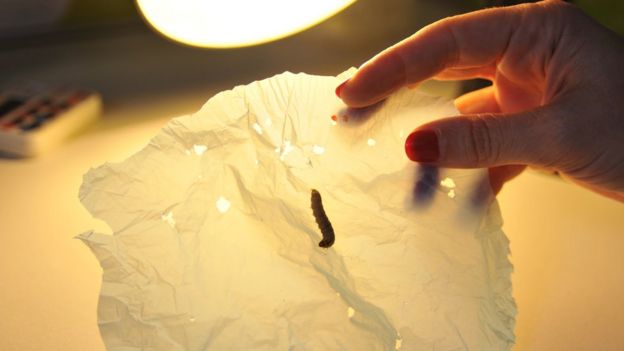A caterpillar that munches on plastic bags could hold the key to tackling plastic pollution, scientists say.
Researchers at Cambridge University have discovered that the larvae of the moth, which eats wax in bee hives, can also degrade plastic.
Experiments show the insect can break down the chemical bonds of plastic in a similar way to digesting beeswax.
Each year, about 80 million tonnes of the plastic polyethylene are produced around the world.
The plastic is used to make shopping bags and food packaging, among other things, but it can take hundreds of years to decompose completely.
However, caterpillars of the moth (Galleria mellonella) can make holes in a plastic bag in under an hour.
Dr Paolo Bombelli is a biochemist at the University of Cambridge and one of the researchers on the study.
"The caterpillar will be the starting point," he told BBC News.
"We need to understand the details under which this process operates.
"We hope to provide the technical solution for minimising the problem of plastic waste."

Dr Bombelli and colleague Federica Bertocchini of the Spanish National Research Council have patented the discovery.
They want to speed up the process of discovering the chemical secrets behind the natural degradation of plastic.
They think microbes in the caterpillar - as well as the insect itself - might play a role in breaking down plastic.
If the chemical process can be identified, it could lead to a solution to managing plastic waste in the environment.
"We are planning to implement this finding into a viable way to get rid of plastic waste, working towards a solution to save our oceans, rivers, and all the environment from the unavoidable consequences of plastic accumulation," said Dr Bertocchini.
"However, we should not feel justified to dump polyethylene deliberately in our environment just because we now know how to bio-degrade it."
The research is published in the journal, Current Biology.
Latest Stories
-
Meghan Netflix show delayed over LA wildfires
12 minutes -
Kwesi Nyantakyi: How the new Sports & Recreation Ministry can transform the Youth
3 hours -
Barca fights back to beat Real Madrid 5-2 for Spanish Super Cup success
4 hours -
Photos: Mahama joins National Prayer and Thanksgiving Service
4 hours -
Mahama reaffirms commitment to education reform, tackles immediate feeding challenges in SHSs
5 hours -
Vetting of ministerial nominees begins on Monday, January 13
5 hours -
Ghanaian, Prof Wisdom Tettey is Carleton University’s 17th President and Vice-Chancellor in Canada
5 hours -
National Cathedral can be built at a reasonable cost without state funds – Mahama
6 hours -
13-year-old girl survives alleged ritual murder attempt in Eastern Region
6 hours -
Anti-corruption campaigner lauds ORAL, commends Mahama
6 hours -
Türkish Ambassador to Ghana congratulates Vice President Opoku-Agyemang
6 hours -
GUTA dissociates itself from its president’s comment urging gov’t to retain E-levy
6 hours -
My victory is the manifestation of the will of God, says Mahama
6 hours -
We’ll strengthen the fight against corruption – Mahama
6 hours -
National Cathedral project expenditure to be probed soon – Mahama
6 hours

